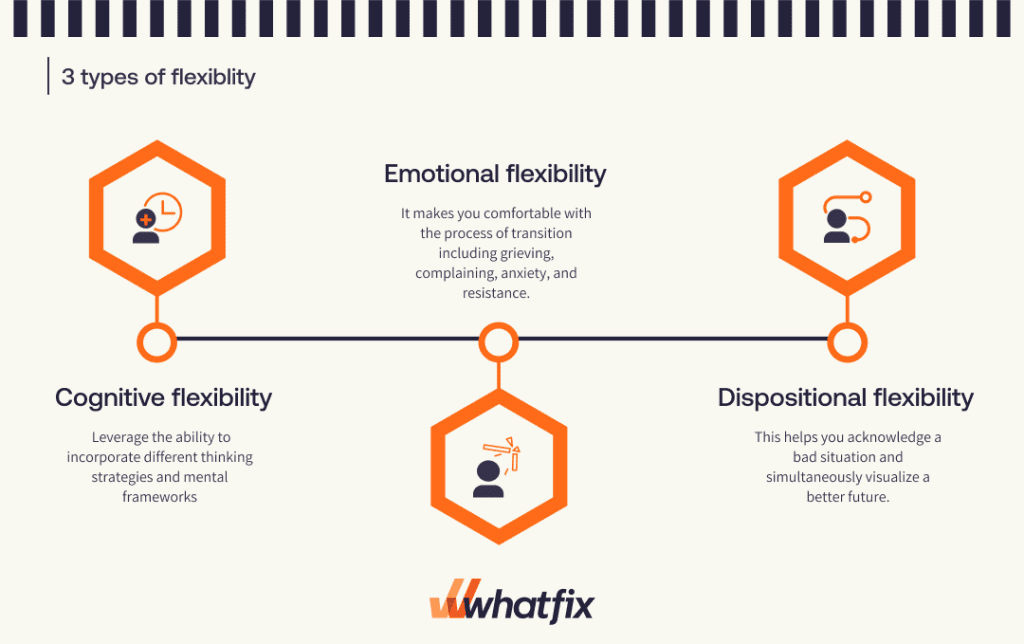
How to Adapt to Change in Your Workplace (2024)
- Published:
- Modified: May 30, 2024

Navigating change is inevitable throughout our careers. Whether it’s introducing new technologies, reorganizing personnel, starting a new job, or shifting to remote work, adapting to these constant changes can often feel like an uphill battle.
Resistance to change or the discomfort it brings is a common sentiment shared by individual employees grappling with the evolving landscape of their workplace.
Mastering the art of adaptation amidst these shifts demands dedication and patience. In this article, we’ll explore the practical strategies tailored to individual employees struggling to cope with the pace of change in their professional environment. From fostering resilience to embracing new opportunities, here’s how you can thrive in the face of workplace evolution.
Understanding Change In the Workplace
Change in the workplace is an inevitable phenomenon driven by various factors including technological advancements, shifts in market demands, organizational restructuring, or responses to global events. Understanding the reasons behind these changes is essential for employees to grasp the importance of adaptation and navigate transitions effectively.
Here are a few reasons why organizations might change.
- Market demands: Businesses operate within dynamic markets subject to constant evolution. Changes in consumer preferences, emerging trends, or competitive pressures often require adjustments in products, services, or operational strategies to maintain relevance and competitiveness.
- Technological advancements: Evolving advancements in technology continually reshape industries and job roles. Adopting new technologies allows organizations to streamline processes, enhance efficiency, and stay ahead of the curve. Failure to embrace technological change can lead to obsolescence and loss of competitive edge.
- Organizational growth or restructuring: As organizations grow or adapt to changing circumstances, they may undergo restructuring initiatives to optimize operations, improve collaboration, or realign resources. Restructuring involves changes in reporting structures, job roles, or departmental functions.
- Regulatory compliance: Changes in legislation, industry regulations, or compliance standards can necessitate adjustments in organizational policies, procedures, or practices. Ensuring compliance is vital for avoiding legal repercussions and maintaining ethical business practices.
The Importance Of Implementing Change For Organizations
Here are a few of the most significant benefits for organizations to implement changes in their legacy processes or systems.
- Remain competitive: Adapting to change enables organizations to stay competitive in dynamic markets. By embracing innovation and responding effectively to evolving customer needs, businesses can position themselves for long-term success and growth.
- Drive efficiency and productivity: Implementing changes can lead to process improvements, increased efficiency, and enhanced productivity. Streamlining workflows, leveraging automation, and adopting best practices enable organizations to optimize resource utilization and achieve better outcomes.
- Foster organizational resilience: Organizations that are adaptable and resilient are better equipped to weather uncertainties and disruptions. Embracing change fosters a culture of resilience, agility, and continuous improvement, enabling organizations to navigate challenges and seize opportunities effectively.
What Is the Importance of Adapting to Change in the Workplace?
Flexibility and workplace adaptability are critical skills that organizations look for in their employees to drive change successfully. Here are the top five benefits of adapting to workplace change:
1. Overcome resistance to change
Change in the status quo may result in strong emotional responses, causing resistance to change among some employees. However, adapting to change allows employees to overcome and embrace this fear. You can also practice change management exercises to anticipate future concerns and reduce nervous energy that may arise due to change.
Examples of how organizations can overcome resistance to change and build adaptable employees include:
- Providing change management training.
- Educating team members on the benefits of an upcoming change project.
- Collecting employee feedback and communicating the change timeline before the change happens.
- Provide on-going performance support for employees after the change is implemented.
2. Makes you a more valuable employee
Data from a 2021 McKinsey study revealed people proficient in adaptability were 24% more likely to be employed.
Being open to adapting to changes in the workplace demonstrates your flexibility, resilience, and willingness to learn. Employers value employees who can adapt to new technologies, processes, and job roles, as they contribute to the organization’s ability to innovate and remain competitive. By embracing change, you position yourself as a valuable asset who can effectively navigate evolving challenges and opportunities, making you indispensable to your team and organization.
3. Increases workplace satisfaction
Embracing change increases workplace satisfaction by fostering a culture of growth, development, and progress. When employees are open to adapting to changes, they are more likely to feel engaged, empowered, and fulfilled in their roles. Moreover, successfully navigating transitions can instill a sense of accomplishment and pride, boosting morale and overall job satisfaction among employees.
4. Ensures a smoother transition
Openness to change facilitates smoother transitions during organizational restructuring, process improvements, or technological advancements. Employees receptive to change are more likely to participate in change initiatives actively, offer constructive feedback, and collaborate effectively with colleagues. This collaborative approach helps minimize resistance, overcome obstacles, and ensure that changes are implemented smoothly and efficiently, ultimately contributing to the organization’s success.
5. Helps you stay relevant
With ongoing, rapid technological advancement across industries, staying relevant in your chosen profession is essential. The more adaptable you are, the more quickly you’ll embrace new ways of doing things, such as learning a new skill, implementing a new workplace application or system, new processes, or new digital strategies.
12 Practical Strategies for Adapting to Change
Here are some tips to improve your ability to adapt to change in the workplace in 2024.

1. Stay positive
Although change is inevitable, change initiatives do not need to harm productivity levels or feel threatened. More often than not, change brings new opportunities. Visualizing these positives can become a solid motivator to adapt to change.
2. Embrace change
According to a report by Oak Change, 18% of employees would consider leaving their jobs if a significant organizational change occurred. Change is such a daunting prospect that almost a fifth of employees would consider leaving their jobs as a natural reaction. But it doesn’t have to be!
Rather than resisting or avoiding change, embrace it as an opportunity for growth and learning. Understand that change is an inevitable part of life. By recognizing and accepting that change is a natural occurrence in the workplace, you can be more open to adapting to it when it happens. Try to look at the opportunities that come with change. Do not attach yourself to the status quo, whether it is the company’s processes, the people you worked with, or the supervisors you worked for.
3. Prepare yourself for the upcoming change
According to Gartner’s Change Management Communication study, 73% of employees affected by change say they suffer from moderate to high stress levels.
This might be because of the need for a proactive approach to prepare beforehand. The change leaders must communicate the reasons and benefits for the upcoming changes to the entire workforce. This will enable them to prepare for the change and drive them one step closer to adapting to change successfully.
Employees can then plan to deal with any adversities and create a robust backup plan if they need support.
Organizational leaders must explore change management tools such as digital adoption platforms (DAP) to ensure the success of their change initiatives, providing on-demand support and change management training to their employees.
With a DAP like Whatfix, organizations enable employees with the in-app guidance and self-help support they need with Tours, Task Lists, Flows, Self Help, and more – right inside their applications and digital workplaces. This in-app assistance guides end-users through their tasks and workflows, providing contextual support to drive efficiency, adopt best practices, and maximize software ROI.
Software clicks better with Whatfix's digital adoption platform
Enable your employees with in-app guidance, self-help support, process changes alerts, pop-ups for department announcements, and field validations to improve data accuracy.
✓ Thank you, the assessment will be sent to your email
4. Set new goals for yourself
Setting new milestones helps shift focus towards actions that attain goals. It reduces anxiety levels and provides a sense of fulfillment. Create milestones based on the SMART framework ( i.e., the goals should be Specific, Measurable, Attainable, Relevant, and Time-bound.) These goals empower employees to find success in any change initiative, and not dwell on the past.
5. Communicate your concerns or fears
Change communication will ultimately decide the fate of many change initiatives and it must be a two-way street between leadership and individual team members.
Employees must understand their feelings about the change and then openly voice their concerns and fears to help proactively overcome them. Seek assistance from peers and leadership. While not a technical aspect of a change project, change communication decides the fate – and success – of the change initiatives.
6. Commit to personal development
While it’s crucial for organizations to support their workforce with the proper performance support and guidance during change projects, individual employees must also take some time for their soft skills and personal development. This will help them become more agile and adaptive in the workplace.
There are abundant resources to help employees build skills to embrace change and adapt to new processes at work. Explore video tutorials on YouTube, take a personal development course at a local community college, check out LinkedIn Learning online programs, or ask managers to host a lunch-and-learn with a local business or change leader.
7. Stay connected to coworkers
Maintain open lines of communication with coworkers to foster a sense of camaraderie and support during times of change. Collaborating with others helps provide different perspectives, insights, and solutions to navigate challenges more effectively.
8. Focus on what you can control
Remember we cannot be in charge of everything that happens around us, but we can control how we react to these events and their impact on our lives.
Instead of fixating on factors beyond their control, individual employees must focus on aspects of the change that they can influence or manage. By taking proactive steps and focusing on actionable tasks, they can maintain a sense of empowerment and agency amidst uncertainty.
9. Build resilience
Cultivate resilience by developing coping mechanisms, problem-solving skills, and emotional intelligence to adapt to adversity and bounce back from setbacks. Resilience training helps navigate change gracefully and confidently, even amid uncertainty or challenges.
10. Be flexible
Adopt a flexible mindset that helps adapt to changing circumstances and adjust as needed. Flexibility enables individual employees to remain agile and responsive to evolving situations, making navigating transitions and overcoming obstacles easier.
Here are three types of flexibility that aid in adapting to change:
- Cognitive flexibility: Leverage the ability to incorporate different thinking strategies and mental frameworks into planning, decision-making, and day-to-day work management.
- Emotional flexibility: Harness the ability to vary one’s approach to dealing with emotions and those of others. Emotional flexibility makes you comfortable with the transition process, including grieving, complaining, anxiety, and resistance.
- Dispositional flexibility: Practice the ability to remain optimistic and, realistic. This helps you acknowledge a lousy situation and simultaneously visualize a better future.

11. Seek support
Don’t hesitate to seek support from mentors, coaches, or trusted colleagues who can provide guidance, encouragement, or advice during times of change. A support network can offer valuable insights and perspectives, helping navigate challenges more effectively.
12. Write down the worst-case scenario
Spencer Johnson said in his book ‘Who Moved My Cheese?’, “What you are afraid of is never as bad as what you imagine. The fear you let build up in your mind is worse than the situation that actually exists.”
If we accept the worst-case scenario, we can efficiently deal with the irrational fears paralyzing our actions. And the chances of the worst-case scenario happening are slim to none!
Take some time to reflect on the worst-case scenario associated with the change. Writing down any concerns helps acknowledge and process fears, making them feel more manageable. Additionally, it helps develop contingency plans and strategies to mitigate potential risks.
Enable your change management efforts with Whatfix end-user analytics, contextual in-app guidance, and moment-of-need support
Make it easier to navigate through changes with Whatfix. Whatfix‘s comprehensive suite of end-user analytics, contextual in-app guidance, and moment-of-need support emerges as a powerful enabler of effective enterprise change management. By leveraging these capabilities, organizations can not only navigate the complexities of change smoothly but also ensure that their workforce is adequately supported throughout the transition.
Explore what Whatfix can do for your change management efforts by scheduling a free demo with us today!

Thank you for subscribing!

